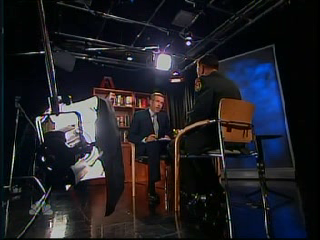 This week has been marked by two big news events: The Petraeus hearings in Washington, and the sixth anniversary of 9/11. It is probably safe to say that this confluence of events has not been an accident.
This week has been marked by two big news events: The Petraeus hearings in Washington, and the sixth anniversary of 9/11. It is probably safe to say that this confluence of events has not been an accident.
Also not an accident: The emphasis on al Qaeda as the enemy in Iraq. The Sunnis — former Saddam Ba'athists — have been repositioned as American allies who are now fighting al Qaeda in Iraq, often referred to simply as "Al Qaeda" in a phrase with very familiar associations — but associations which pre-dated any sort of Al Qaeda presence in Iraq.
Frank Rich picked up on this in his column this past Sunday, noting the coincidence of 9/11 with Petraues Week, as well as how the generic reference to "Al Qaeda" has taken root:
Anchoring the "CBS Evening News" from Iraq last week, Katie Couric seemed to be drinking the same Kool-Aid (or eating the same lobster tortellini) as Mr. O'Hanlon. As "a snapshot of what's going right," she cited Falluja, a bombed-out city with 80 percent unemployment, and she repeatedly spoke of American victories against "Al Qaeda." Channeling the president's bait-and-switch, she never differentiated between that local group he calls "Al Qaeda in Iraq" and the Qaeda that attacked America on 9/11. Al Qaeda in Iraq, which didn't even exist on 9/11, may represent as little as 2 to 5 percent of the Sunni insurgency, according to a new investigation in The Washington Monthly by Andrew Tilghman, a former Iraq correspondent for Stars and Stripes.
Yesterday, NBC's Brian Williams picked up that ball with a vengeance, directly challenging General Petraeus on that point:
Over the last two days of testimony, you mentioned Al Qaeda, by our count, 160 times. Now for a lot of Americans, al Qaeda - that's the guys who flew those planes into the buildings in New York, and Washington, and Pennsylvania. Explain what you mean — because Al Qaeda in Iraq wasn't around that day.
Petraues responded that Al Qaeda in Iraq was "part of the greater al Qaeda movement" and "the
the organization that has carried out the most horrific, most damaging terrorist actions in Iraq." Petraues had previously referred to al Qaeda as "public enemy number one" in Iraq, even though it represents at most 8 - 15% of the total insurgency — and that's the uppermost estimate. Various intelligence reports put that at a much lower number, all the way down to only 2 -5% of the total insurgency.
That's the background. Watch how Williams gets Petraeus to backtrack on that point:
From "public enemy number one" to "it's not a unified force" and framing it as insurgents who had formed "a loose confederation with al Qaeda at various times" — wow. Though Petraeus said "We do not label them all al Qaeda and I have tried very hard not to imply that or to state that," consider the transcript from his first day testimony: Gains against al Qaeda is the first reason cited for progress in Iraq, and he says "tribal rejection of al Qaeda...may be the most significant development of the past eight months." Al Qaeda figures prominently in examples of progress made across the country, and there are frequent references to "al Qaeda and other extremists" and "al Qaeda and insurgent sanctuaries" and "al Qaeda and its affiliates." Most often, though, the references are only to al Qaeda. In light of Williams' questioning, it would seem that Petraeus was at best imprecise and at worst misleading in his frequent use of the term to apply to that particular non-unified, loosely-confederated force. Funny, that.
Williams wasn't alone in having at Petraeus yesterday in D.C. — all three network anchors flew down for some facetime. Charlie Gibson asked whether the U.S. was "buying time for the Iraqis to get their act together - we're buying it with American lives, and they're not holding up their end of the bargain" (Petraues said he was "frustrated" twice during that interview).* Katie Couric clarified herself on al Qaeda, noting that it they were "just a small part of the problem" in the insurgency (Petraues returned to his position that they were the most destructive) and challenged Petraeus on the charges that " you all are manipulating data" (he stood by his data and said, if anything, the military's data was more complete). Note that Petraues did these three half-hour segments one by one, remaining as generally unflappable as he did during two days of hearings, under pretty challenging and skillful questioning by all three anchors. Which is why his backtrack on al Qaeda with Williams was even more significant to behold.
Brian Williams Interviews General Petraeus (27 min) [NBC]
Katie Couric Interviews General Petraeus (30.06 min) [CBS]
Charlie Gibson Interviews General Petraeus (2.26 min) (full interview not online) [ABC]
Related:
Frank Rich: As The Iraqis Stand Down, We'll Stand Up [NYT]
The Myth of AQI [Washington Monthly]
Transcript of Iraq Hearing Statements [CNN]
*Also frustrating: Trying to watch this coverage on the ABC site, where they only have two short clips from Gibson's Petraeus interview (1:22 here and 2:26 here), sandwiched on either side by commercials &mdsah; which you can't pause, by the way — if you try, it opens up a news window for the advertiser, which is totally annoying. More annoying: Unlike NBC and CBS, ABC offers no simulcast of the broadcast, at all, just individual clips (with their own individual commercials). They've got a 3 pm pre-broadcast webcast, also available on iTunes, but otherwise, if you miss the 6:30pm you're outta luck. Charlie Gibson, you make it hard for a girl to get to know you.
